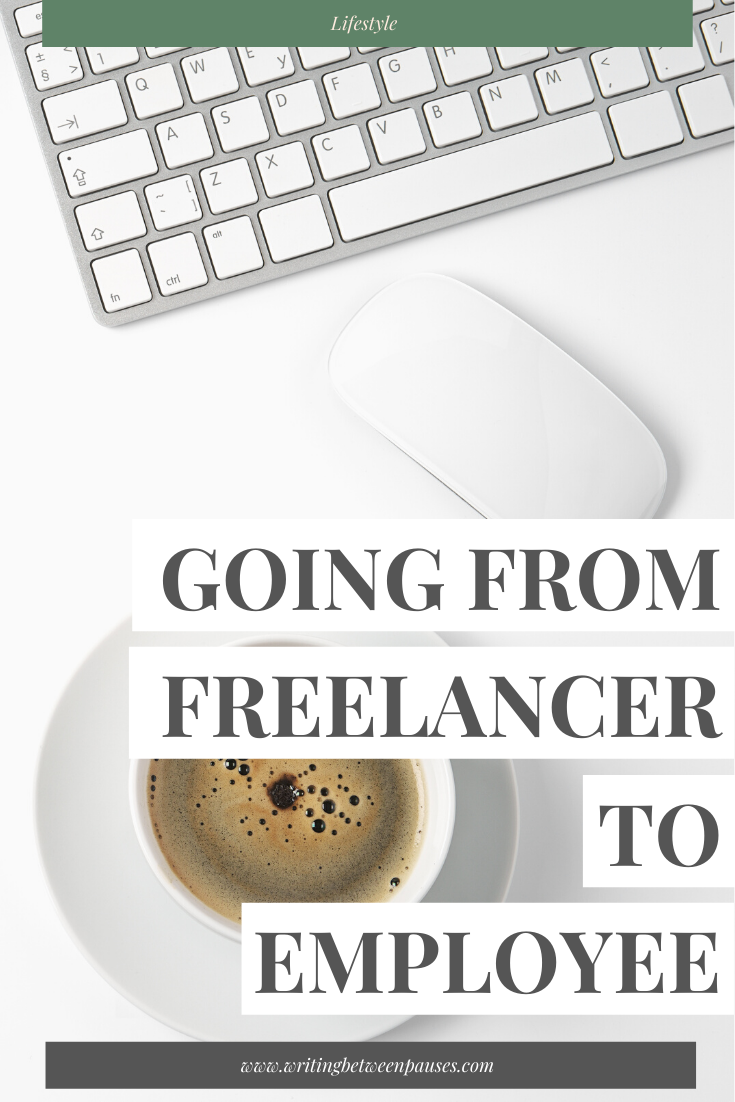There are so many blog posts out there about switching from being a full-time employee to a freelancer. I should know—I wrote some myself.
But back in December when I made the decision to accept a job (a full-time job as an employee!), I started Googling (because that’s who I am). Here are a few of my searches:
“advice for going from freelance to employee”
“what to know going back to being an employee”
This shouldn’t come as a surprise, I suppose, but there isn’t a lot being written out there about people who go from freelance to being an employee. A lot of this is because the SEO for these search terms is dominated by people selling courses (big surprise) and a lot of this content is about switching to being a freelancer (and hey, why don’t you buy this course to help you learn how to get clients??).
People who are quitting freelance to go back to being an employee aren’t a money-making opportunity. And that’s just fine.
For me, being a freelancer was really challenging, it was outside of my comfort zone, and it helped me grow a lot as a person and in my career. Was it my forever plan? Absolutely not. I went into it absolutely knowing that. It was simply something I had to do to make money for the time being, because I found finding a job really challenging—I had really strict guidelines I wanted when it came to being both a parent and an employee.
Freelancing can be really hard. Working for yourself is not the way the Instagram gurus like to portray. Have you ever seen those ads where those same gurus brag about selling 6-figures worth of services in a month? Well, someone has to do 6-figures worth of work if they sell it--so that means they work a lot... and that’s if they’re being honest about how much they sell their services. (The truth is probably that they aren’t making that much money. There is a huge controversy right now with coaches being exposed for not making the big bucks they said they did—which basically renders their services null and void. Shockingly people who work a lot and make a ton of money at their jobs typically don’t spend time bragging about it constantly.)
This is all to say: lots of people go from being freelancers to employees and thrive because of it. If you like me are doing Google searches to see if anyone has lived that, I hope you find this and know you're not alone.
I did want to share a little bit more about what I’ve been mulling over when it comes to this big change in my life. Let’s dive in!
1. Working for yourself isn’t for everyone (and we have to stop pretending that it is).
Here’s the thing: it’s totally ok to be “just an employee.”
I feel like the mood on the internet is often that working for someone else is useless and your career is only valuable if you start your own business. I just simply don’t believe that’s true. We all find ways of feeling valuable. If owning your own business or freelancing is something that calls to you, by all means, go for it! But if it doesn’t call to you, there isn’t anything wrong with that.
As well, you might really think you’ll thrive freelancing, but then find that you don’t like it—and that’s ok too! It takes a certain personality type, to be quite honest, and some people are just better at it.
Freelancing isn’t better than being an employee. Different things work for different people and encouraging everyone to freelance or own their own business to the detriment of their personality or stress level is… bad.
2. Being a freelancer uses more energy on a wider variety of things.
Not only was I managing client’s social media and writing a ton of copy week-to-week, I was also acting as an account manager, a bookkeeper, and a project manager. It was way more mental energy every single week and for 75% of those tasks (like organizing my time sheet, invoicing, keeping track of my books, and more) I wasn’t being paid because it wasn’t client work.
Plus, at least 50% of my mental capacity went towards worrying about my taxes.
It was a lot. It was super stressful and I felt like I didn’t know how to handle it. A lot of the information on how to handle these things is, surprise, behind a paywall these days; there is no one giving clear cut, good advice on how to manage that level of stress. It’s understandable, but it makes freelancing as a profession a lot harder for people who might thrive in it. And it makes people like me, who are high stress anyway, more likely to leave freelancing.
3. I actually have more time now.
So it turns out, not working weekends hugely improves my mental health? Not having to wake up at 4am every weekday to get massive amounts of scheduling and invoicing done is a huge stress relief?
And being able to set my hours and say, “I’m gone at 5pm!” is another huge relief?
This is to say: I actually have more free time now than I ever did in the past year of freelancing and that’s really, really exciting.








